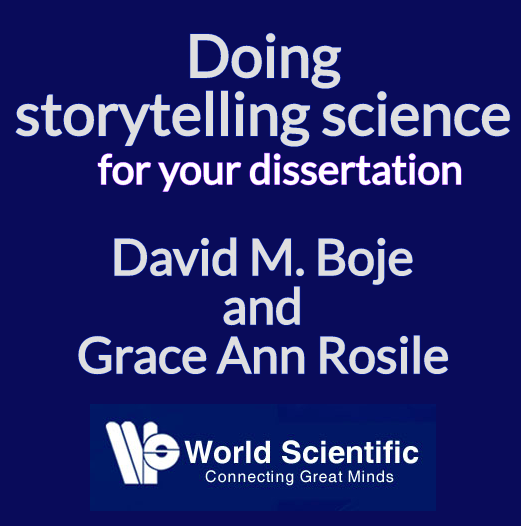For Denmark and Sweden Events
Malmö University, Sweden Keynote Address by
Boje and Rosile May 23 2022 - Click for Slides
Malmo University, Sweden
What is the Riddle of
Participative Thinking in Bakhtin’s Architectonic
Dialogism? May 16, 18, & 19, 2022 Slide
set
Click for
Bakhtin meets Enthinkment Circle - YouTube
May
16 Part I: Working with Kenneth Mølbjerg Jørgensen
May 18 Part II: Working with Ann Starbæk Bager
May
19 Part III: Working with Anete Mikkala Camille Strand
For more on Enthinkment Circle visit Enthinkment.com
More on Antenarrative Processes, visit Antenarrative.com
Boje’s Home site DavidBoje.com
Presentation of Bakhtin's Architectonics to The Enthinkment
Circle https://enthinkment.com May 10th, 2022 Slide
set
Malmö University Cohort Mar 7, 2022: 2 Events
Part I:
Slides for Collaborative Storytelling Conversations by David M. Boje and Grace Ann Rosile
Part II:
Slides
for Enthinkment
and
Collaborative
Future Making
 just released Routledge book
2019b
just released Routledge book
2019b
MENU
You are on
Enthinkment.com main site
or Go
to Main Site of Little Buddha
-
How
To Use Your 'MIND-PLAYER'?
Please consult your medical doctors before doing any practices on this website. Boje is a Storytelling Researcher. He is not a medical doctor. IF you are Impatient, just skip to the Answer
 See YouTube
video on the Important Contribution of Professor Louis Ralph
Pondy, & antenarrative expalined
See YouTube
video on the Important Contribution of Professor Louis Ralph
Pondy, & antenarrative expalined
 soon to be released book 2019a
soon to be released book 2019a
Boje's Slides for the seminar What is the
'storytelling science' of Abilene's Water -- talk
given April 18 2019 at McMurry University
Asking Multinational
Corporate Personhood to Give a Moral Account of their
Antenarrative-Answerability for the Decline of the
American Empire
David M. Boje
Updated April 25, 2019
ABSTRACT
Antenarrative asks five existential questions: what came
before, what is beneath, what is between, what is becoming of
care, and what future is arriving? There is an
antenarrative-answerability we must now ask of 'business
storytelling' and its fake storytelling. We are like the crew
of the Titanic, rearranging the deck chairs and business is
playing all the familiar story-tunes as the ship sinks. USA
struck its iceberg in the 1970s when Big plastic coalesced
with Big sugar and Big Salt to corrupt the diet of Americans
and take its 'High Fructose Corn Syrup' (HFCS) global.
This is a story of a failure of moral answerability of
multinational food and beverage, plastic and pharmaceutical
corporations putting their greed and growth ahead of
scientific 'good sense.' Plastic has entered the water cycle
in form of BPA and its substitutes BPS and BPF are equally
toxic, some of it worse. Fresh safe drinking water and
sanitation getting so scarce, 6,000 children die every day of
water-borne diseases that are entirely preventable with modern
science. We are approaching a situation of 4 billion people
living in water scarcity, going without clean fresh, drinkable
tap water, while the bottled soda, and bottled water industry,
and the water wars between nations continues to escalate.


The claims are
fantastic, and bold corporate social responsibility of their
personhood, but if they are exaggerations, distortions,
half-truths, then we must ask Coca-Cola to give a moral
account of oneself, because corporations have been declared a
legal person, separate and distinct form their shareholders,
and as of 2010 the personhood of the corporation can even give
PAC money to elect candidates, without any moral acccount of
corporate personhood.
Quantum storytelling is
intercellular, inter-bodies, and intra-cosmos, but can it save
all life as we know it from the global water crisis, whirling
our way, as early as 2030? The 4th matter-state of water, this
proto-water and ortho-water that populates the cosmos are more
than social constructivism, with a death grip on the
linguistic turn. This quantum storytelling is about
quantum-sociomateriality, and always about protecting fresh
water so life of not just humans, but animals, fish, plants,
and biotic life can exist. Earth has 97.5% salt water, and of
the 2.5% remainder of fresh drinkable water, most is
inaccessible in snow caps or deep underground, leaving about
2% or so to divvy up among all living things requiring fresh
water to survive as a species. It is specisism
to claim only human beings have the right to exist, and I
prefer a posthumanist sociomaterialism
standpoint (Barad, 2007) on water=life, water=ethics. If 6,000
children die, here-and-now daily, and if 60% of marine life is
already gone in recent decades, and if global warming is
actually not just a debate, but a fact of life on planet
earth, then it is time to be giving a moral account of one's
corporate personhood.
